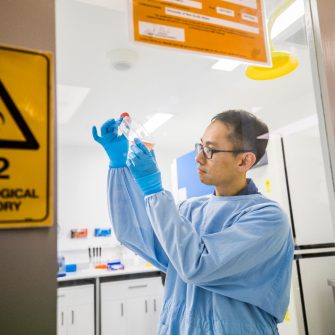Master of Food Science
- Commencing Terms
- Term 1, 2 & 3
- Duration
- 2 Year(s)
- Delivery Mode
- Face-to-face (includes blended)
- Campus
-
Kensington
- Codes
- Program code 8037
-
2025 Indicative first year full fee
- $42,500*
-
2025 Indicative full fee to complete degree
- $87,000*
-
2025 Indicative first year full fee
- $58,000*
-
2025 Indicative full fee to complete degree
- $121,000*
- Overview
- Entry requirements
- What will I study?
- Future careers
- How to apply
- Fees & Scholarships
Overview
The Master of Food Science is designed for food scientists and graduates wanting to advance and expand their knowledge and skills in their current area of expertise and for engineers who want to move into food science from a science-based perspective.
You will develop your technical knowledge and ability to analyse food science problems and gain a deeper understanding of the agrifood business. At a global top 20 university (QS World University Rankings, 2025), you can meet and maintain professional accreditation standards while developing your career opportunities.
Key features
This degree enables students to develop strategies and tools to increase efficiency and performance, while learning alongside like-minded industry professionals.
You will also build your technical knowledge and ability to analyse and solve food science problems and justify professional decisions.
Why study this degree at UNSW?
The Master of Food Science is delivered by the School of Chemical Engineering at UNSW. The school focuses on working with national and international partners to develop sustainable chemical solutions in the energy, resources, water, food and health sectors.
You will study in world class facilities alongside leading researchers who are also teachers and mentors. We were ranked five-stars in Food Sciences, the highest possible rating, by the ERA Research Excellence in 2019. The school has been delivering the best in research and teaching for over 65 years.
Benefits of studying with us:
- Strong partnerships with industry in education, research, training and employment
- Learn in new facilities with purpose built modern laboratories and collaborative learning spaces
- Study at a global top 20 university (QS World University Rankings, 2025)
The UNSW School of Chemical Engineering is focused on working with national and international partners to develop sustainable chemical solutions in the energy, resources, water, food and health sectors.
We partnered with Goodman Fielder, one of the major flour millers in Papua New Guinea (PNG), to improve public health nutrition through micronutrient-fortified wheat flour. In a collaboration between universities, private companies and governments, this research initiative is providing better food sources for vulnerable communities.
Want to see more from UNSW Engineering?
Entry requirements
Admissions to the standard 2 year program requires the following:
A Bachelor Degree or AQF Level 7 equivalent in a cognate discipline with a minimum 65% average.
Cognate disciplines |
|
|
|
Recognition of Prior Learning (Credit Transfer)
UNSW recognises that many students have professional experience or relevant previous studies. If you have worked in a relevant industry or have relevant previous study experience, you may be eligible for credit points that would enable you to complete your Master of Engineering Science in as little as one year, or another accelerated option listed below dependent on your previous study and experience.
English language requirements
You may be asked to provide evidence of your English proficiency to study at UNSW depending on your educational background and citizenship. English language skills are vitally important for coping with lectures, tutorials, assignments and examinations - this is why UNSW requires a minimum English language competency for enrolment.
If you’re completing an Australian Year 12 qualification (e.g. NSW HSC or equivalent), you do not need to provide anything extra to prove your proficiency. Your qualification will be used as evidence of your English proficiency.
If you do need to provide evidence of your English proficiency, this will be indicated in your application. You can prove this by providing evidence that you meet one or more of the following criteria:
- English language tests and university English courses
- Prior study in the medium of English
- Other qualifications
If you need to improve your English skills before you start your degree, UNSW College’s Academic English Programs are for you. The programs are suitable for various English levels and help you prepare for university studies and life in Australia.
For more details, visit the English Language Requirements page.
Admissions to the standard 2 year program requires the following:
A Bachelor Degree or AQF Level 7 equivalent in a cognate discipline with a minimum 65% average.
Cognate disciplines |
|
|
|
Recognition of Prior Learning (Credit Transfer)
UNSW recognises that many students have professional experience or relevant previous studies. If you have worked in a relevant industry or have relevant previous study experience, you may be eligible for credit points that would enable you to complete your Master of Engineering Science in as little as one year, or another accelerated option listed below dependent on your previous study and experience.
Admission pathways
If you do not meet the requirements for direct entry into your chosen degree, you may be eligible for a pathway program with UNSW College. UNSW College provides alternative entry options using university-approved content so that you can start your UNSW journey with confidence.
English language requirements
You may be asked to provide evidence of your English proficiency to study at UNSW depending on whether you are from an English-speaking background or non-English speaking background. English language skills are vitally important for coping with lectures, tutorials, assignments and examinations - this is why UNSW requires a minimum English language competency for enrolment.
If English is not your first language, you’ll need to provide proof of your English proficiency before you can be given an offer to study at UNSW. You can do this by providing evidence that you meet one or more of the following criteria:
- English language tests and university English courses
- Prior study in the medium of English
- Other qualifications
If you need to improve your English skills before you start your degree, UNSW College’s Academic English Programs are for you. The programs are suitable for various English levels and help you prepare for university studies and life in Australia.
For more details, visit the English Language Requirements page.
Check the specific English language requirements for this program
Program structure
Our courses provide strategies and tools to increase efficiency and performance, as well the opportunity to learn alongside like-minded industry professionals.
You will also work on a complex, open-ended research-based project, requiring project planning and the ability to analyse, interpret and communicate results proficiently; the completion of this component provides a pathway towards postgraduate research degrees through the development and demonstration of research-related skills.
The program is designed to meet a number of academic and professional requirements including:
- Updating technical knowledge and skills in an existing specialisation
- Acquiring new knowledge and skills in a different specialisation
- Updating qualifications and knowledge to meet or maintain professional accreditation standards
- Providing opportunities for continuing professional development
- Creating opportunities for interaction with those at the cutting edge of the discipline
- Providing a preliminary step towards postgraduate research degrees.
Full program structure
The Master of Food Science is a two-year degree for students who want to move into the area or update their qualifications in Food Science. Upon completion of this degree, you will have a specialised knowledge in Food Science and Technology. The general degree structure includes:
- 4 Advanced Disciplinary Courses (2 core and 2 electives)
- 7 Disciplinary Courses (4 core and 3 electives)
- 2 Science Technical Management Course (1 core and 1 elective)
- 3 Enquiry-based courses (which include a research project or product development courses)
The program is designed to help you master the foundations of modern Food Science. Advanced Disciplinary and Disciplinary Core Courses are designed to sharpen your technical mastery and keep you at the forefront of industry innovation. Through these you will learn the technical knowledge and skills and update your knowledge in cutting-edge developments in Food Science. You will study core courses like:
- Sensory Analysis of Foods
- Advanced Food Microbiology
- Food Process Principles
- Food Products and Ingredients Technology
- Food properties and functions Laboratory
- Food Safety and Quality Assurance
You will specialise with industry-aligned electives like:
- Advaned Food Chemistry
- Advanced Nutrition
- Data-driven decision making in Chemical engineering and Food Science
- Unit operations in food processing
- Advanced food engineering
- Advanced Process Technologies
- Engineering work related learning for postgraduates
Other courses
- Master the essentials of launching a startup, gain real-world skills to successfully commercialise your ideas through a hands-on course designed for tomorrow’s innovators.
- Science Technical Management electives will help you:
- build your ability to communicate and defend critical decisions with clarity and confidence
- apply ethical frameworks to solve complex challenges
- developing leadership agility to drive projects, inspire teams, and shape strategy in high-stakes environments.
- You will complete a research project or bring a product from concept to reality within the enquiry-based courses. You can use this course to refine research capabilities for postgraduate success or build a foundation for a future PhD or cutting-edge industry leadership role to tackle global challenges in sustainability, food security, and R&D.
Future careers
When you complete postgraduate study in Food Science at UNSW you will open up a range of highly specialised and senior roles in the food science industry. Most roles for food scientists are in the private industry. Private industry has increased its demand for food scientists because their expertise is necessary for developing food products, along with ensuring quality and safety.
UNSW Food Science graduates are in high demand due to their high skill level, with excellent employment opportunities in the food and beverage industries, university and CSIRO research and government regulatory bodies such as FSANZ.
As a food scientist or technologist you could work in laboratories, research departments, or in quality inspection and control on food processing/production lines.
Potential careers
Potential careers in the following areas:
- Quality assurance and food safety (global food standards specialist, food regulatory affairs manager)
- Nutrition (nutritional product developer, corporate wellness nutritionist)
- Food technology (plant-based food technologist, cellular agriculture specialist)
- Product design and development (flavour scientist, sensory evaluation lead, packaging innovation engineer)
- Food analytics (food data scientist, supply chain analyst)
- Food microbiology (fermentation scientist, bioprocessing technician)
- Food chemistry (ingredient innovation chemist, food encapsulation specialist)
- R&D project manager
- Food sustainability consultant
How to apply
Applications must be submitted through our Apply Online portal. We encourage you to submit your completed application as early as possible to ensure it will be processed in time for your preferred term. Some high-demand programs and Faculties with limited places may have an earlier application deadline or commencement date. Find out more.
Ready to start your application?
For most international students, applications are submitted via our Apply Online, opens in a new window service. We encourage you to submit your completed application as early as possible to ensure it will be processed in time for your preferred term.
Some high-demand programs with limited places, may have an earlier application deadline or may have an earlier commencement date. For more information visit our international applicant information page.
Ready to start your application?
Fees & Scholarships
*Fees are subject to annual review (or when required) by the University and may vary accordingly.
Indicative fees are a guide only and have been calculated based on the typical enrolment patterns of students undertaking the program. The indicative fees listed here is an estimate for tuition only and excludes non-tuition fees and charges. The amount you pay will vary depending on the calendar year of enrolment, the courses you select and whether your study load is more or less than 1 Equivalent Full Time Student Load (48 units of credit (UOC) per year).
You should not rely on indicative fees as fee increases are assessed when required and may exceed the indicative figures listed here. Actual fees are calculated on enrolment. More information on fees can be found at the UNSW fees website.
*Fees are subject to annual review by the University and may increase annually, with the new fees effective from the start of each calendar year. The indicative fees listed here are based on an estimated average and are for tuition only, other fees and charges are not included. The amount you pay will vary depending on the calendar year to enrol, the courses you select and whether your study load is more or less than 1 Equivalent Full Time Student Load (8 courses per year).
Indicative fees are a guide for comparison only based on current conditions and available data. You should not rely on indicative fees. More information on fees can be found at the UNSW fees website.
Indicative fees to complete the program have been calculated based on a percentage increase for every year of the program. Fee increases are assessed annually and may exceed the indicative figures listed here.
Indicative fees to complete the program include tuition plus an estimate of study-related costs of approximately $1,000 per year. To find out more about other costs, visit UNSW International.
Scholarships
At UNSW, we award over $83 million in scholarships each year. We pride ourselves on rewarding excellence and making university accessible to students from all walks of life. Whether you’re a domestic or international student, our range of scholarships, prizes and awards can support your journey.
Featured scholarship
The UNSW Women in Engineering Research Scholarship was established to assist women of high academic achievement with an interest in a research and/or an academic career in engineering. UNSW Engineering offers two Women in Engineering Top-up Scholarships every semester.

QS World University Rankings, 2025

AFR Top100 Future Leaders Awards, 2020-2025

#1 Australian uni attended by start-up founders




